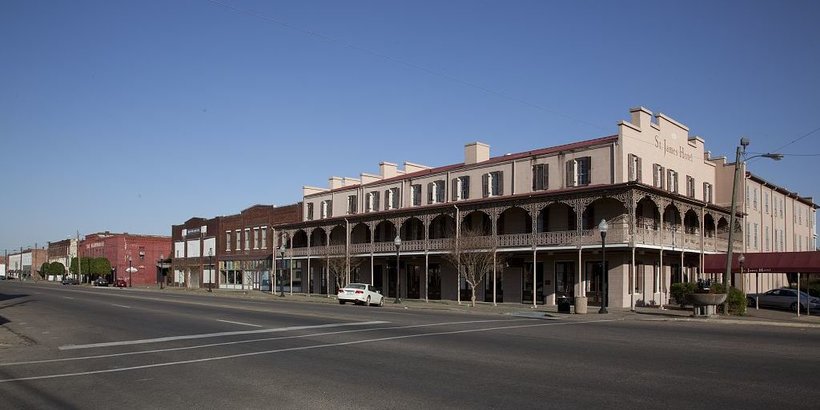
From the beginning of the Civil War until the end of the Second World War, no family had as dramatic an impact on our state as the Bankhead family of west Alabama. Members of the family graced the covers of Time magazine, presidents attended their funerals, and without their support, Franklin Delano Roosevelt’s New Deal legislation might never have passed. This is their story.
In September 1842, Alabama had been a state for barely two decades. It was fewer than twenty years before a civil war would convulse the entire country, with the sons and fathers of the South and North doing bloody battle for four long, heart-stricken years that would leave over 600,000 Americans dead on battlefields from the blistering plains of Texas to the wooded valleys of Pennsylvania.
To this era was born John Hollis Bankhead (1842-1920) in present day Lamar County. John Hollis enlisted in the Confederate Army at the age of 19. He was wounded in several battles but emerged from the war whole of limb with a captain’s rank. A member of both the Alabama House of Representatives and the State Senate during Reconstruction, in 1881 this ambitious man secured an appointment as Warden of the state’s penitentiary in Wetumpka. In 1886, he rose to national prominence after winning Alabama’s Sixth Congressional District that included Walker, Lamar, and Fayette counties. Bankhead served in the U.S. House for twenty years, before his appointment to the Senate in 1907 (U.S. Senators were then elected or appointed by state legislatures) where he served until his death in 1920.
With his wife, Tallulah Bankhead (formerly Brockman), John Hollis had five children: Louise, Marie, John Hollis II, William, and Henry. The two oldest sons would rise to positions of prominence that would rival their father’s remarkable achievements.
John Hollis Bankhead II (1872-1946) attended schools in Wetumpka and Fayette before receiving degrees at the University of Alabama and Georgetown Law School. In 1894, he moved to Jasper and married his high-school sweetheart, the daughter of a local merchant. Like his father, John Hollis went into politics and served at the 1901 Alabama constitutional convention. He and his father operated the Bankhead Coal Company, where he served as president from 1911-1925. Elected to the U.S. Senate in 1930, John Hollis was a key supporter of President Roosevelt’s New Deal policies. He died of a heart attack in 1946 and is buried at Oak Hill Cemetery in Jasper.
The most notable child of the first John Hollis Bankhead was William B. Bankhead (1874-1940) who served as the Speaker of the U.S. House of Representatives. Like his older brother John Hollis II, William B. Bankhead attended county schools in west Alabama before also receiving degrees at the University of Alabama and Georgetown Law School. After a brief stint as Huntsville’s city attorney, William moved to Jasper in 1905 to practice law with his older brother. From 1910 to 1914, William served as a local prosecutor, before winning a seat in the U.S. House of Representatives in 1916. In 1935 he was elected House majority leader and then Speaker of the House in 1936.
As Speaker, William B. Bankhead was one of the most powerful men in the country. Like his brother, William was a staunch supporter of FDR’s New Deal policies that had a momentous impact on the South. Of perhaps greater significance, Speaker Bankhead opposed isolationist sentiment in Congress in the years leading up to World War II and helped defeat a proposed Constitutional amendment requiring a national referendum for a declaration of war. Speaker Bankhead died in 1940 after an abdominal hemorrhage. Contemporary accounts estimated that 40,000 people attended his funeral at the First Methodist Church in Jasper. Among the attendees were President Roosevelt, Vice-President Truman, members of Roosevelt’s Cabinet, and numerous Senators and Congressmen
The most colorful character of the Bankhead family was actress and socialite Tallulah Bankhead (1902-1968), the daughter of William B. Bankhead and granddaughter of John Hollis Bankhead. Born in Huntsville, Tallulah was determined from an early age to be an actress, a not-altogether respectable profession for young ladies at the time. But through a mixture of talent, shrewdness, and grit, the young actress ascended to the heights of the film industry in its earliest days in the 1920s and 30s, co-starring in films with Gary Cooper and Cary Grant. In 1944, acclaimed movie director Alfred Hitchcock tapped her for a starring role in Lifeboat, adapted from a John Steinbeck short story. Tallulah’s career arc probably reached its apex in 1948 when Time magazine put her on its cover as the magazine lauded Tallulah for her stage role in Broadway’s Private Lives. A life-long opponent of segregation, Tallulah in her later years wrote articles calling for racial equality.
The Bankhead family is singular for its impact on the history and culture of Alabama and the nation. This summer, I encourage you to find out more about this fascinating family. The Bankhead House and Heritage Center in Jasper is a wonderful place to visit, and the Department of Archives and History in Montgomery is also an excellent source for additional information.
Greg Reed is the Alabama Senate Majority Leader and represents Senate District 5, which is comprised of all or parts of Winston, Walker, Tuscaloosa, Jefferson, and Fayette counties.












